Strictly Personal
Tinubu and ghosts of fuel scarcity, new naira notes, By Festus Adebayo
Published
1 year agoon
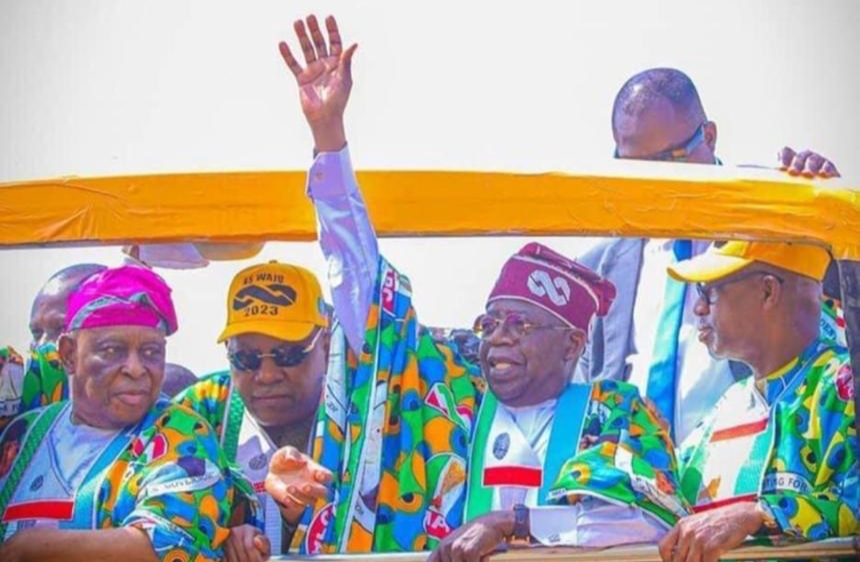
In a piece I wrote entitled A O M’erin J’oba At Tinubu’s Colloquium(April 1, 2018) I warned that the man who has now become the presidential candidate of the All Progressives Congress, (APC) Bola Ahmed Tinubu, was making a strategic mistake in assuming that Buhari loved him. Or that he would probably want to relinquish power to him. Using a famous folklore rendered as tale told by the moonlight in traditional African Yoruba, but which Chief Obafemi Awolowo’s Minister of Works and folklorist/writer, Joseph Odunjo, brought into vivid perspective in his Alawiye Yoruba literature series, I explained how Tinubu, resting his belief on a mistaken belief that Buhari would requite the good done him in making him president, would make a fatal fall.
Using the animal world as a motif, Odunjo told this story which ancient Yoruba belief used to depict gross human deception and how human beings are easily susceptible to and capable of mischief. Represented as a character with power, majesty and acclaim, the mammoth-sized Elephant, the beast, was the untouchable king of the jungle and lord of the manor whose humongous size was a huge bother to other animals in the jungle. Several efforts were made to oust his prowess, to no avail. So, a plot was hatched using his majesty as his destruction. Tortoise, a cunning and serpentine animal, was procured to do the hatchet job. Tortoise resolved that, given Elephant’s size and height, violence would not bring him to his hilt but a seemingly innocuous strategy of deception, praise-singing and bootlicking.
Tortoise then went into the cave of the Almighty Elephant. His message was that, all animals had purposed to make him their King in the jungle. Elephant was to come to the palace adorned in the full regalia of a King. Prior to the day, Tortoise had dug a very deep ditch that could swallow Elephant’s elephantine and mammoth size by the palace. He however decorated it with a beautiful wool carpet worthy of a king’s royal feet, complete with an ornamented chair just at the edge of the royal carpet. Encircling the carpet, all the animals in the town clapped and hailed the new King dressed in flowery royal robe as he walked majestically towards the royal carpet. They cheered the Elephant on, shouting a o m’erin j’oba, eweku ewele. The Elephant, in turn, fascinated by the splendor and cheer, walked majestically to be crowned and fell into the ditch and unto his death.
My conclusion in that piece about the Tinubu-Buhari silent tango was: “The President is thus prepared to play the Tortoise, sing a o m’erin j’oba and fawn Tinubu the Elephant so as to humour his ego. The strategy would be that, by the time it would be too late for Tinubu to make a U-turn, the Hannibal and Chaka the Zulu would lift up his scabbard, draw out his dagger and skewer the flesh of an Elephant who cannot see that he is on a dangerous path.” Is this folklore apt in the description of what is playing out between the duo today?
As they say in legal parlance, the most recent outburst of Tinubu in Abeokuta, Ogun State, last Wednesday has provoked issues for determination. The issues are in the form of rhetoric. You will recall that Tinubu, on a campaign train to the ancient city, had stirred the hornet’s nest when he alleged that the currency re-design policy of the Muhammadu Buhari government and the current fuel scarcity that has literally turned Nigeria into a Dystopian disaster were orchestrated by a veiled God-knows-who, with the aim of ensuring that he didn’t win next month’s presidential election.
To be sure, the allegation of a conspiracy theory was already in the public domain, long before Tinubu made that allegation. With this final Tinubu affirmation of the ploy woven masterfully in high places against him, the headline of this piece should then have been The Columnist As A Seer. In previous installments entitled Emefiele’s Terrorism Mess (December 25, 2022) and Buhari and Emefiele’s Buga Handshake (January 20, 2023) except for the fuel scarcity addition to the conspiracy theory, I submitted that the Naira re-designation policy could be targeted at the APC candidate.
In Abeokuta last week Wednesday, Tinubu mortally bit the bullet again. In his now familiar drawl, delivered in Yoruba, he hit his bare knuckles on the spatula. “If they like, they can change the ink in the naira note, we will shock them, we will win the election; the opposition (the umbrella party) will be defeated… We will take over the government from them; they are traitors that want to wrest the government from us…We will use our PVCs to take over the government from them, if they like, let them say there is no fuel, we will trek there. They are full of mischief, they want to create fuel crisis, they have started creating fuel crisis…Let the price of fuel continue to increase, they are the ones that know where they are hoarding it. They are hoarding naira notes, they are hoarding fuel, we will vote and we will win,” he told a jubilant but rowdy crowd of supporters. He thereafter revved the people up to a revolution.
The issues for determination from this outburst are tripodal. One is the domain that Tinubu always chooses to rouse Nigerian people to militant action and provoke the beast in them, apologies to Fela Anikulapo-Kuti. Why the choice of Abeokuta? Is it deliberate? Was Tinubu doing this, conscious of the historical signification of Abeokuta or it occurs by mere happenstance?
Second, who exactly were these arrows shot at? Forget the very jejune and I dare say, lacking-creative-acumen press release issued by the Directorate of Media & Publicity of the APC Presidential Campaign Council. In the statement, it hung on the opposition Peoples Democratic Party (PDP) the arrows shot by Tinubu.
“For the records, Asiwaju Tinubu during APC campaign rally at Abeokuta on Wednesday, in his statement, did not mention, blame or accuse President Muhammadu Buhari for the current challenges in the country… (he) was only adverting government’s attention to the sabotage being carried out by some Fifth columnists in the system, possibly working in cahoots with the PDP…Tinubu is aware of the salutary efforts by President Buhari to end the fuel queues, by chairing a 14-man panel…How does an advisory genuinely made by Asiwaju Tinubu to protect and create goodwill for the government of his party become an attack? It can only be so in the jaundiced view of the PDP,” the office said.
But for the dog-eat-dog mentality and saber-rattling deployed as language of communication and accepted as part and parcel of the political language and temperature of Nigeria, the APC PCC should be scandalized nationally by this barefaced cookery. It is a very tame effort at assuming that the Nigerian is a fool and has a very low reasoning capacity. The reasons are obvious.
Was Atiku Abubakar the “they” who wanted to “change the ink in the naira note”? Is the PDP currently in government, to whom Tinubu swore that “we will take over the government from them”? Is Abubakar the “if they like, let them say there is no fuel…they are full of mischief,” and who “want(s) to create fuel crisis” and “are hoarding naira notes, they are hoarding fuel,” to whom he promised that “we will vote and we will win”?
A few days after the Tinubu outburst, media reports claimed that the man, famously dubbed the Landlord of Lagos, made a nocturnal sneak into Daura, Katsina State home of Buhari, in company with three APC governors, on a “fence-mending” with the president. As at the time of going to press, this alleged sneak had not been denied nor, as usual, attributed to the “handiwork of PDP and Labour Party sympathizer” journalists by the Tinubu Ananias and Saphirra clown in the APC PCC. The question I ask is, what is responsible for this sabbatical that honour has taken from political parties’ communication machinery in Nigeria? Methinks that, rather than make mockery of oneself and the decades that one had put into journalism practice, deep thinking should show journalpreneur wolves in sheep’s clothing currently speaking for politicians that they should not allow reversible politicians tarnish what is left of their perceived honour?
Now, was Tinubu right in assuming that “they” are fighting him? I think he was. I had always argued that, rather than basing his political tomorrow on Buhari, Tinubu should have cleaned up his Yoruba home and won its confidence while using it as a bargain for 2023. He rather believed that it was more expedient to do obeisance for the Cow in the hope that he would honour him with his chunky meat. For instance, in another piece I did which I entitled Tinubu the Ap’ejalodo and His Strange Fish Friend, (September 16, 2018) using an ancient tale told in traditional African pre-colony which helped to tame the greed of pre-and post-colonial Yoruba society, as well as any tendency within it to play God, I argued that, as the Yoruba would say, constant removal of perceived bad woods from the log of woods under a cooking pot would boomerang. It was the time Tinubu was said to have made up his mind to remove Akinwumi Ambode. Now that Buhari is playing God with Tinubu’s presidential aspiration, that piece makes sense now for its Karmic significance, doesn’t it?
Even a fool knows that Buhari does not want Tinubu to succeed him. Second is that there is a mutual disdain between the two which both have clothed in shawls over the years. Buhari has, over the decades, built an impregnable moral universe round himself; a universe whose precinct was delineated by him, membership of which he defines from his narrow conception. Tinubu does not fit that definition. Tinubu is also too agitative, too Alutaic, perhaps in the mould of MKO Abiola; too much of a disrupter of long-established rulership codes, in spite of the contradictions of his being a member of that same ruling caste. Atiku Abubakar is a lesser evil for the president and occupiers of his fiefdom to banter with.
The third issue for determination is whether Tinubu deliberately spins those nukes or they are mere Freudian slips. Mainly used in psychoanalytic theories, Freudian slips, also called paraptaxis, was authored by Sigmund Freud. It is defined as an error in speech, memory or physical actions which occur due to interference from an unconscious or subdued mind with or an internal train of thoughts. You will recall that, in June, 2022, hours before the APC congress, Tinubu had made similar spark where he literally called Buhari out.
Considered a denigration of Buhari, he narrated how, without him and God, Buhari could not have been president in 2015 after he lule-edthree times in his bid for the presidency and had to weep on national television. Tinubu concluded that it was his turn to take over power. It was a daring speech which many thought was derring-do that would finally collapse his presidential aspiration. Unexpectedly, that speech finally became a deus ex-machina of Tinubu’s aspiration, giving it a huge leap, we were told. From that speech was extracted the most notoriously mentioned phrases in social and political discourses of today – O lule and emi lo kan.
Finally, should Tinubu have been making those off-the-cuff outbursts when he knows that he would eventually crawl on his belly like a coyote to beg Buhari? I don’t think so. Is it an effective strategy to tame Buhari with revelations of his nocturnal political gambles so that he can be railroaded from his preference of a successor? Maybe, but in war, which Tinubu’s current quest for the presidency can be likened to, you don’t half-decapitate your enemy. You slash their necks with deft, brutal precision. If Buhari holds the key to Tinubu transmuting from the Lord of Lagos to Lord of Aso Rock, those revelations should have been guided confidentially like a licked bowl of soup which the Yoruba say does not make a pendulum-like swing and sound in the bowels of an elder. Revealing them publicly and seemingly making mockery of an unforgiving General like Buhari could be a fatal blow to his presidential ambition.
You may like
-


Tinubu’s ‘Renewed Hope Agenda’ repositioning Nigeria as global investment hub— VP Shettima
-
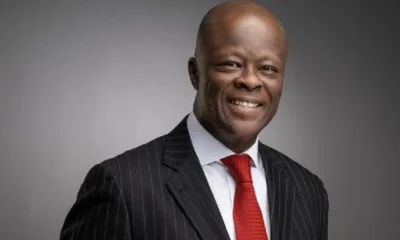

Nigerian govt denies reports it plans to borrow pension fund for infrastructure
-
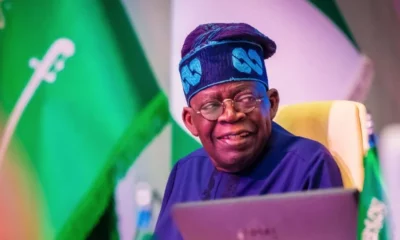

Nigerian govt to open student loan application portal May 24
-


Nigeria targets 10,000MW hydropower through sustainable power project
-


Nigeria’s inflation hits 28-year high of 33.69% in April
-


Nigeria: President Tinubu unveils 21 major initiatives
Strictly Personal
If I were put in charge of a $15m African kitty, I’d first deworm children, By Charles Onyango-Obbo
Published
5 days agoon
May 13, 2024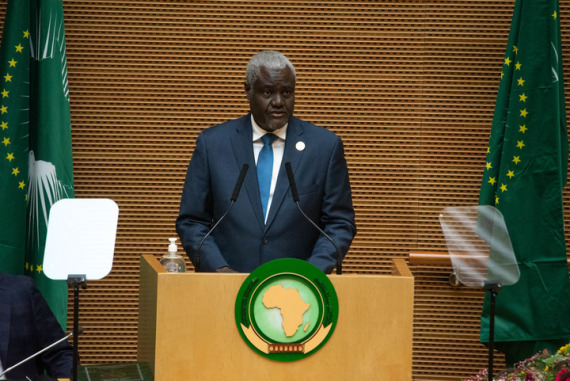
One of my favourite stories on pan-African action (or in this case inaction), one I will never tire of repeating, comes from 2002, when the discredited Organisation of African Unity, was rebranded into an ambitious, new African Union (AU).
There were many big hitters in African statehouses then. Talking of those who have had the grace to step down or leave honourably after electoral or political defeat, or have departed, in Nigeria we had Olusegun Obasanjo, a force of nature. Cerebral and studious Thabo Mbeki was chief in South Africa. In Ethiopia, the brass-knuckled and searingly intellectual Meles Zenawi ruled the roost.
In Tanzania, there was the personable and thoughtful Ben Mkapa. In Botswana, there was Festus Mogae, a leader who had a way of bringing out the best in people. In Senegal, we had Abdoulaye Wade, fresh in office, and years before he went rogue.
And those are just a few.
This club of men (there were no women at the high table) brought forth the AU. At that time, there was a lot of frustration about the portrayal of Africa in international media, we decided we must “tell our own story” to the world. The AU, therefore, decided to boost the struggling Pan-African New Agency (Pana) network.
The members were asked to write cheques or pledges for it. There were millions of dollars offered by the South Africans and Nigerians of our continent. Then, as at every party, a disruptive guest made a play. Rwanda, then still roiled by the genocide against the Tutsi of 1994, offered the least money; a few tens of thousand dollars.
There were embarrassed looks all around. Some probably thought it should just have kept is mouth shut, and not made a fool of itself with its ka-money. Kigali sat unflustered. Maybe it knew something the rest didn’t.
The meeting ended, and everyone went their merry way. Pana sat and waited for the cheques to come. The big talkers didn’t walk the talk. Hardly any came, and in the sums that were pledged. Except one. The cheque from Rwanda came in the exact amount it was promised. The smallest pledge became Pana’s biggest payday.
The joke is that it was used to pay terminal benefits for Pana staff. They would have gone home empty-pocketed.
We revive this peculiarly African moment (many a deep-pocketed African will happily contribute $300 to your wedding but not 50 cents to build a school or set up a scholarship fund), to campaign for the creation of small and beautiful African things.
It was brought on by the announcement by South Korea that it had joined the African Summit bandwagon, and is shortly hosting a South Korea-Africa Summit — like the US, China, the UK, the European Union, Japan, India, Russia, Italy, Saudi Arabia, and Turkey do.
Apart from the AU, whose summits are in danger of turning into dubious talk shops, outside of limited regional bloc events, there is no Pan-African platform that brings the continent’s leaders together.
The AU summits are not a solutions enterprise, partly because over 60 percent of its budget is funded by non-African development partners. You can’t seriously say you are going to set up a $500 million African climate crisis fund in the hope that some Europeans will put up the money.
It’s possible to reprise the Rwanda-Pana pledge episode; a convention of African leaders and important institutions on the continent for a “Small Initiatives, Big Impact Compact”. It would be a barebones summit. In the first one, leaders would come to kickstart it by investing seed money.
The rule would be that no country would be allowed to put up more than $100,000 — far, far less than it costs some presidents and their delegations to attend one day of an AU summit.
There would also be no pledges. Everyone would come with a certified cheque that cannot bounce, or hard cash in a bag. After all, some of our leaders are no strangers to travelling around with sacks from which they hand out cash like they were sweets.
If 54 states (we will exempt the Sahrawi Arab Democratic Republic for special circumstances) contribute $75,000 each, that is a good $4.05 million.
If just 200 of the bigger pan-African institutions such as the African Development Bank, Afrexim Bank, the giant companies such as MTN, Safaricom, East African Breweries, Nedbank, De Beers, Dangote, Orascom in Egypt, Attijariwafa Bank in Morocco, to name a few, each ponied up $75,000 each, that’s a cool $15 million just for the first year alone.
There will be a lot of imagination necessary to create magic out of it all, no doubt, but if I were asked to manage the project, I would immediately offer one small, beautiful thing to do.
After putting aside money for reasonable expenses to be paid at the end (a man has to eat) — which would be posted on a public website like all other expenditures — I would set out on a programme to get the most needy African children a dose of deworming tablets. Would do it all over for a couple of years.
Impact? Big. I read that people who received two to three additional years of childhood deworming experience an increase of 14 percent in consumption expenditure, 13 percent in hourly earnings, and nine percent in non-agricultural work hours.
At the next convention, I would report back, and possibly dazzle with the names, and photographs, of all the children who got the treatment. Other than the shopping opportunity, the US-Africa Summit would have nothing on that.
Charles Onyango-Obbo is a journalist, writer, and curator of the “Wall of Great Africans”. X@cobbo3
Strictly Personal
AU shouldn’t look on as outsiders treat Africa like a widow’s house, By Joachim Buwembo
Published
1 week agoon
May 9, 2024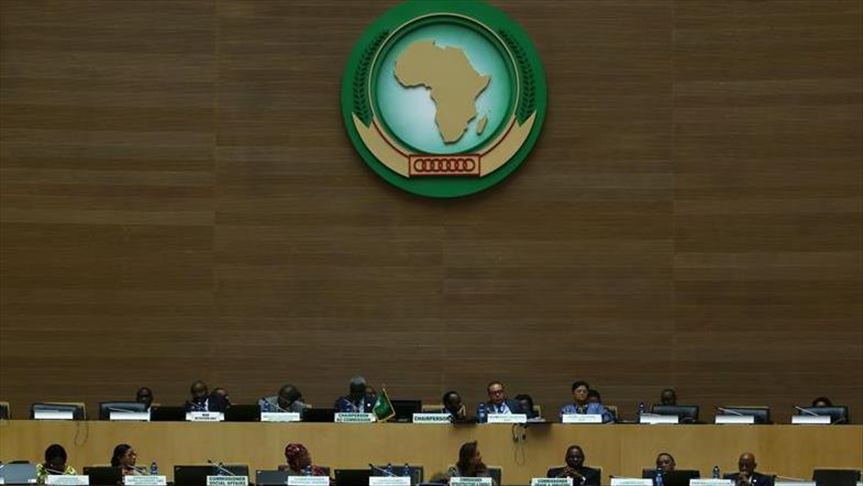
There is no shortage of news from the UK, a major former colonial master in Africa, over whose former empire the sun reputedly never set. We hope and pray that besides watching the Premier League, the managers of our economies are also monitoring the re-nationalisation of British Railways (BR).
Three decades after BR was privatised in the early to mid-nineties — around the season when Africa was hit by the privatisation fashion — there is emerging consensus by both conservative and liberal parties that it is time the major public transport system reverts to state management.
Yes, there are major services that should be rendered by the state, and the public must not be abandoned to the vagaries of purely profit-motivated capitalism. It is not enough to only argue that government is not good at doing business, because some business is government business.
Since we copied many of our systems from the British — including wigs for judges — we may as well copy the humility to accept if certain fashions don’t work.
Another piece of news from the UK, besides football, was of this conservative MP Tim Loughton, who caused a stir by getting summarily deported from Djibouti and claiming the small African country was just doing China’s bidding because he recently rubbed Beijing the wrong way.
China has dismissed the accusation as baseless, and Africa still respects China for not meddling in its politics, even as it negotiates economic partnerships. China generously co-funded the construction of Djibouti’s super modern multipurpose port.
What can African leaders learn from the Loughton Djibouti kerfuffle? The race to think for and manage Africa by outsiders is still on and attracting new players.
While China has described the Loughton accusation as lies, it shows that the accusing (and presumably informed) Britons suspect other powerful countries to be on a quest to influence African thinking and actions.
And while the new bidders for Africa’s resources are on the increase including Russia, the US, Middle Eastern newly rich states, and India, even declining powers like France, which is losing ground in West Africa, could be looking for weaker states to gain a new foothold.
My Ugandan people describe such a situation as treating a community like “like a widow’s house,” because the poor, defenceless woman is susceptible to having her door kicked open by any local bully. Yes, these small and weak countries are not insignificant and offer fertile ground for the indirect re-colonisation of the continent.
Djibouti, for example, may be small —at only 23,000square kilometres, with a population of one million doing hardly any farming, thus relying on imports for most of its food — but it is so strategically located that the African Union should look at it as precious territory that must be protected from external political influences.
It commands the southern entrance into the Red Sea, thus linking Africa to the Middle East. So if several foreign powers have military bases in Djibouti, why shouldn’t the AU, with its growing “peace kitty,” now be worth some hundreds of millions of dollars?
At a bilateral level, Ethiopia and Djibouti are doing impressively well in developing infrastructure such as the railway link, a whole 750 kilometres of it electrified. The AU should be looking at more such projects linking up the whole continent to increase internal trade with the continental market, the fastest growing in the world.
And, while at it, the AU should be resolutely pushing out fossil-fuel-based transportation the way Ethiopia is doing, without even making much noise about it. Ethiopia can be quite resolute in conceiving and implementing projects, and surely the AU, being headquartered in Addis Ababa, should be taking a leaf rather than looking on as external interests treat the continent like a Ugandan widow’s house.
Buwembo is a Kampala-based journalist. E-mail:buwembo@gmail.com
EDITOR’S PICK


Tinubu’s ‘Renewed Hope Agenda’ repositioning Nigeria as global investment hub— VP Shettima
Vice President Kashim Shettima believes the “Renewed Hope Agenda” of the President Bola Tinubu administration is gradually transformating Nigeria into...


Dubai’s cybersecurity firm CyberKnight sets up business in Africa
Dubai-based cybersecurity company, CyberKnight, has expanded its business into Africa by opening an office in Egypt. CyberKnight, a cybersecurity advisory...


Nigerian govt denies reports it plans to borrow pension fund for infrastructure
The Nigerian government has denied reports that it plans to borrow the N20tn pension fund to finance infrastructural projects. In...
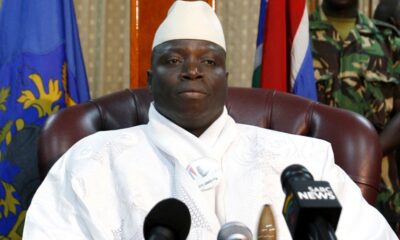

Gambian ex-minister convicted in Swiss court for crimes against humanity
In a landmark decision utilizing Europe’s universal jurisdiction, a Swiss court on Wednesday found a former Gambian government minister guilty...


Hope for persons with disability, as Muleya shares promising story of inclusivity in governance
Frederick John Muleya, a differently abled person based in Choma town, Southern Province, has shared some insights of changes being...


South Africa: President Ramaphosa signs major health bill two weeks before election
South Africa’s President Cyril Ramaphosa signed a measure into law on Wednesday that promises to offer universal health coverage, hailing...


Burna Boy, Asake, Davido, Tems, other Nigerian stars bag BET nominations
Thursday was a good day for Nigerian music stars, and especially the entertainment industry, as singers Burna Boy, Ayra Starr,...


Ethiopian marathon legend Bekele returns to Olympics after 12-year absence
After a 12-year absence on the international race circuit, Ethiopian marathon legend, Kenenisa Bekele, has announced that he will return...


Nigerian govt to open student loan application portal May 24
The Nigerian government has announced that the portal for the long awaited student loan scheme will open on May 24,...


Google relaunches Hustle Academy with AI focus to empower African SMBs
Google has relaunched the 2024 cohort of its Hustle Academy, a programme dedicated to accelerating the growth of small and...
Trending
-

 Musings From Abroad2 days ago
Musings From Abroad2 days agoChina’s Hailiang, Shinzoom to establish vehicle battery installations in Morocco
-

 Metro2 days ago
Metro2 days agoChurch in Kasama warns government against misusing Cyber Security Act
-

 Sports1 day ago
Sports1 day agoEthiopian marathon legend Bekele returns to Olympics after 12-year absence
-

 Culture24 hours ago
Culture24 hours agoBurna Boy, Asake, Davido, Tems, other Nigerian stars bag BET nominations


